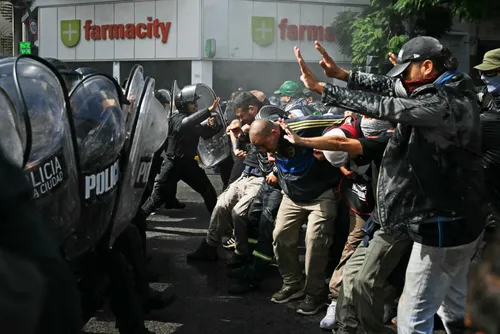
A rubber bullet fired by police blinded a protester who took to the streets of the Argentine capital, Buenos Aires last Wednesday (10) to demand an end to the scrapping of popular kitchens, called “comedores”. The complaint was made by the human rights organization Associação Contra a Violência Institucional (ACVI).
ACVI is following the case and states that Argentine security forces “are using this type of weaponry, violating all types of international protocols and regulations, attacking the integrity of people trying to demonstrate.”
The injured young man was believed to be a member of the Unión de Trabajadores y Trabajadoras de la Economía Popular, a union that represents informal workers. Dozens of protesters were injured due to police violence.
“We received the news over the weekend. This is a common practice that has become popular in Chile, where security forces use less lethal weapons to hit the face,” explained Matías Busso, lawyer and representative of ACVI, to the website The Cry of the South.
He said he will go to court over what happened against the Minister of National Security, Patricia Bullrich, and his counterpart from the city of Buenos Aires, Waldo Wolff.
Authoritarian protocol
In the protest on the 10th, police forces, both federal and from the city of Buenos Aires, launched tear gas bombs and fired rubber bullets and water cannons at those taking part in the protest on Avenida 9 de Julio, in the central region of Buenos Aires.
There are reports that several protesters were shot in the face. The security forces’ argument for the violence, which, according to local press, lasted around 20 minutes, was that the protesters violated anti-picketing protocol. The set of repressive rules was announced by Javier Milei’s government a few days after taking office in December.
The protocol prohibits the blocking of streets and other public roads in the country due to political demonstrations and protests. But in the event, the great popular participation meant that the event took part of Av. 9 de Julio, until it was completely closed. This began the repression, ordered by the Ministry of Security, led by Bullrich.
The protest was against Milei’s policy that scrapped the eaters. Around 40 thousand of these community kitchens stopped receiving food from the federal government, and began to depend on municipal and state support, in addition to donations.
Milei’s measure comes at a time when there is an increase in the number of people turning to eaters. Currently, around 57% of the population is currently below the poverty line, the worst rate since the great crisis of 2002.
Editing: Matheus Alves de Almeida

Source: www.brasildefato.com.br

